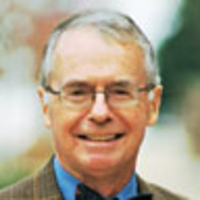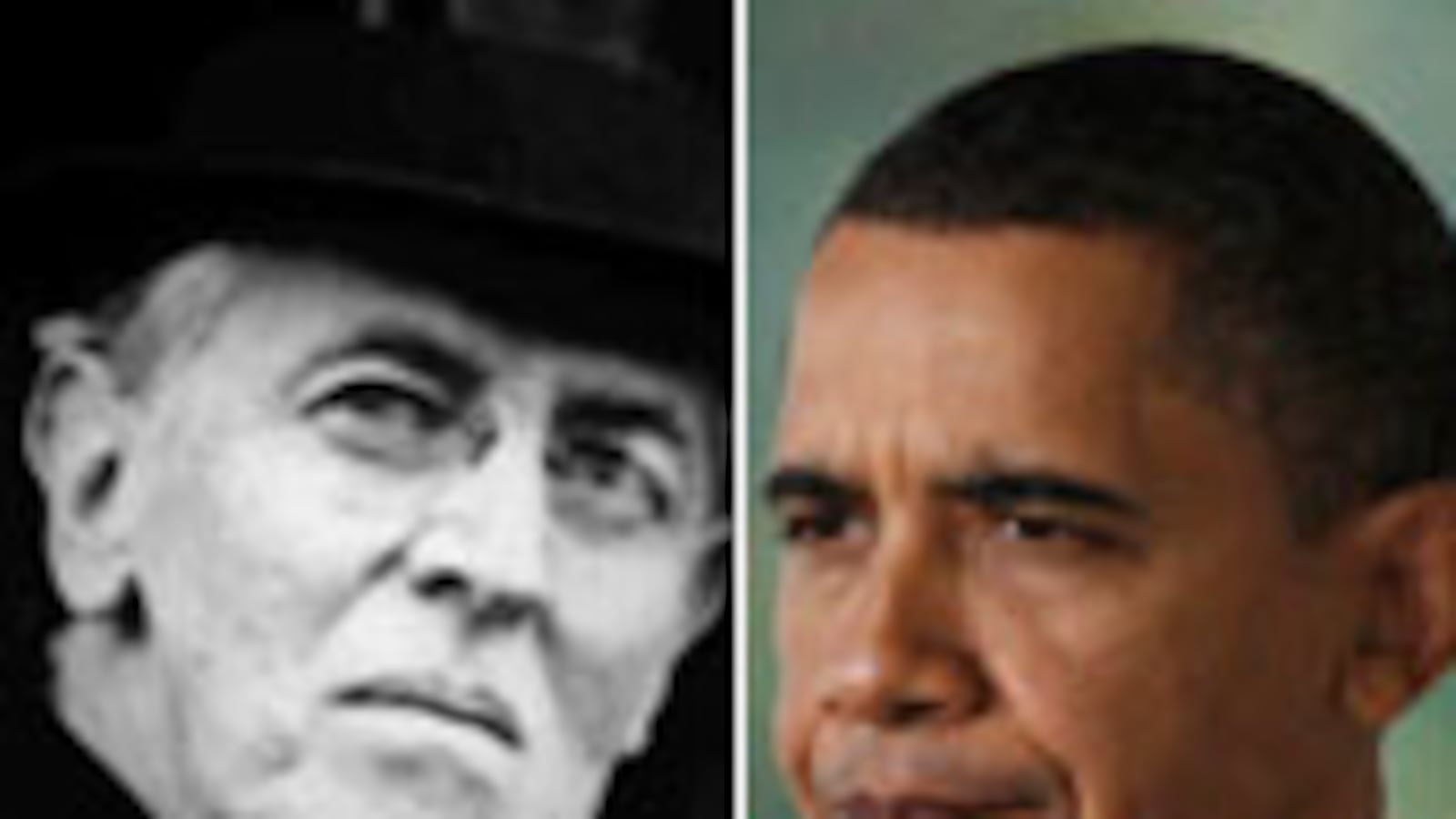
When President Obama accepts the Nobel Prize for Peace in Oslo on December 10, he will step into the shadow of the last sitting president to receive that prize, Woodrow Wilson. This is not just a coincidence: All presidents who have proclaimed lofty values and ideals and wanted to see them extended in the world have been labeled “Wilsonian.” Obama, like Wilson, has drawn both praise and condemnation for his soaring rhetoric, but, like Wilson, he looks for practical, down-to-earth measures to advance his ideals. Just as Marx once said, “I am no Marxist, just Karl Marx,” Wilson’s ghost could say, “I am no Wilsonian, just Woodrow Wilson.”
Ironically—because Wilson oversaw a racist administration and failed to deal with racial injustice—no president since has resembled him more than Barack Obama. Their public images are strikingly similar, cool, deliberative, thoughtful, and each was a professor before entering politics. Soaring eloquence is something else they have in common. Presidents no longer write all their own speeches the way Wilson did, but Obama’s two books show that he likewise owes his eloquence to himself, not his staff.
When someone implored [Wilson] to declare war in the name of God, he retorted. “War isn’t declared in the name of God; it is a human affair entirely.”
Unlike Wilson, Obama has faced major foreign policy challenges from the outset of his presidency. Except in Mexico—where civil war and terrorism raged and spawned an attack on the United States—Wilson did not have to make truly big diplomatic decisions until two years into his administration, after the outbreak of World War I. He made those decisions in much the same careful, thoughtful manner as Obama has approached American involvement in Afghanistan. In contrast to some presidents, Wilson did not take the United States into war (in his case, World War I) because he thought God was telling him to do it. When someone implored him to declare war in the name of God, he retorted, “War isn’t declared in the name of God; it is a human affair entirely.” Like Obama he faced accusations of dithering and cowardice, particularly from his great rival Theodore Roosevelt. He did not cloak American intervention in the garb of holy war but saw it as a choice of evils and followed Martin Luther’s injunction to “sin boldly.”

The parallel runs further. Just as Obama is trying to limit American objectives in Afghanistan, Wilson was at pains not to make intervention in World War I a crusade to spread democracy. He said, “The world must be made safe for democracy.” He used the passive voice intentionally; he did not believe this country could make the world safe for democracy but could only play a part in striving to reach that goal. As for trying to impose democracy on other people, he later explained, “There isn’t any one kind of government which we have the right to impose upon any nation. So that I am not fighting for democracy except for the peoples that want democracy.”
Wilson carried his circumspection further during and after the war. In his Fourteen Points, laid down in January 1918, he never used the word democracy or the term “self-determination.” That term was coined by the British Prime Minister David Lloyd George; Wilson later used it, but sparingly and never as a general principle to be applied to all peoples and all places. Lloyd George also uttered the words “war to end all wars”; Wilson never said them. After the war, he promoted his new organization, the League of Nations, as something that could afford only partial insurance against war but was still well worth embarking on to try to prevent another world war. The League was a breathtaking venture to remake world affairs, yet Wilson saw it as a practical, evolving arrangement for the maintenance of peace and order.
The Obama-Wilson parallel extends to domestic affairs as well. As president, Wilson hit the ground running with big reform programs. In his first two years, he pushed through a lower tariff accompanied by the income tax, the Federal Reserve, anti-trust laws, and the Federal Trade Commission; in his second two years, he enacted the first federal aid to farmers, abolition of child labor (later struck down by the Supreme Court), the first federal inheritance tax, and an eight-hour day for railroad workers.
In the current struggle over health care, Obama is trying to repeat Wilson’s feat in lowering the tariff by succeeding where presidents before him failed. At the same time, he is trying to bring off what Wilson did with the Federal Reserve by grappling with issues of great technical complexity and enormous impact on the economy, which engage fiercely competing interests. Unfortunately for Obama, the health-care struggle also resembles Wilson’s last great political fight and biggest failure—his effort to gain American membership in the League of Nations. That fight featured bitter partisan division and obstruction, and its crucial element, collective security, presented much the same dilemma as today’s “public option”—how to include an obligation yet satisfy critics with ways to opt out. Patience and firmness combined with flexibility are lessons Obama can take from Wilson’s successes as one of the greatest legislative leaders in the White House, rivaling or even surpassing Franklin Roosevelt and Lyndon Johnson.
The lessons Obama can take from Wilson’s failure with the League are the same, along with one more—stay healthy. The League fight ended in bitter stalemate because at a critical juncture Wilson suffered a massive stroke that left him physically impaired, emotionally unbalanced, and warped in judgment. That stroke caused the worst crisis of presidential disability in this country’s history, and it transformed Wilson from a resourceful, canny leader into an often delusional creature who blocked all efforts to work out a compromise that might have gained membership in the League and a greater role in maintaining international peace and order. That final role laid the basis for the “Wilsonian” caricature of him as an out-of-touch idealist unwilling to deal with the real world and a zealot bent on his own way at all costs. It was a cruel fate for someone who had been so different.
As President Obama goes to Oslo and steps into Wilson’s shadow, he might remember how Robert Frost chided John Kennedy, “Be more Irish than Harvard.” Now it should be, “Be more Wilson than Wilsonian.”
Plus: Check out Book Beast for more news on hot titles and authors and excerpts from the latest books.
John Milton Cooper, Jr., is professor of history at the University of Wisconsin. He is the author of Breaking the Heart of the World: Wilson and the Fight for the League of Nations and The Warrior and the Priest: Woodrow Wilson and Theodore Roosevelt, among other books. He was recently a fellow at the Woodrow Wilson International Center for Scholars in Washington, D.C. He lives in Madison, Wisconsin.






